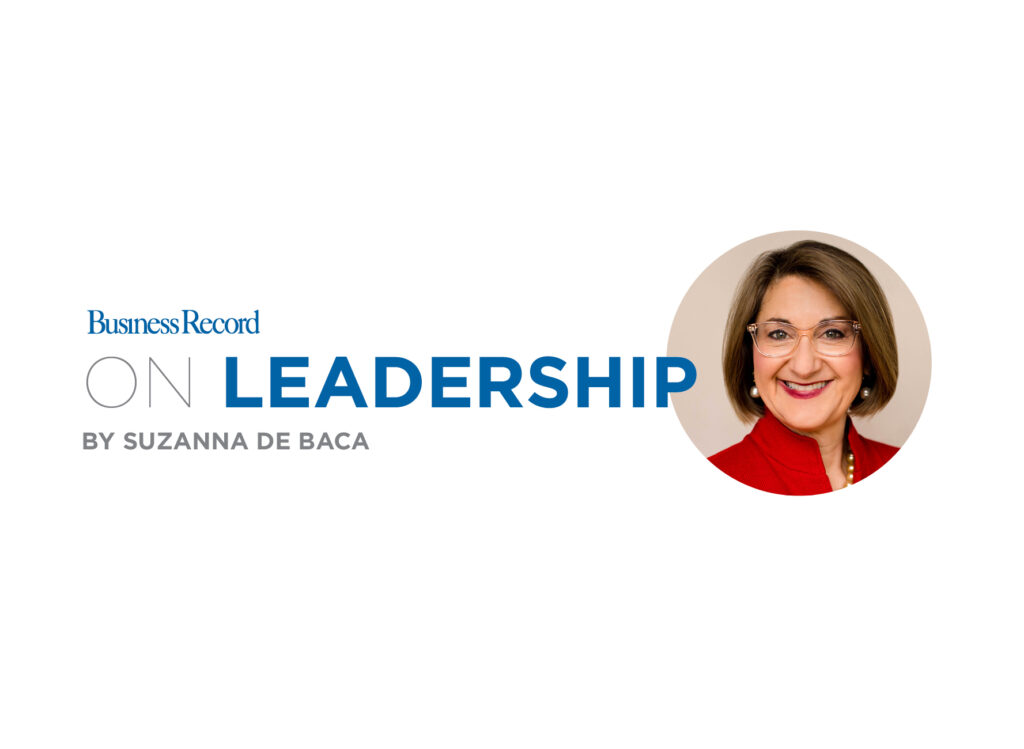On Leadership: The No. 1 leadership skill for 2024? Emotional intelligence

In one of my first jobs after college, I had the privilege of meeting Daniel Goleman, the psychologist who would go on to write the book “Emotional Intelligence.” I invited Goleman to speak at a conference I was organizing, and he discussed the concept that emotional intelligence (EI or EQ) was as important as mental intelligence in life and business. Many of the conference attendees dismissed Goleman’s work as New Age psychobabble.
Goleman’s mixed reviews at my long-ago conference came floating back to me recently when I came across this headline in Forbes: “Emotional Intelligence No.1 Leadership Skill For 2024, Says Research.”
How times have changed. “Emphasizing the significance of emotional intelligence (EI) has become increasingly crucial in modern leadership and organizational settings,” asserted the article.
Why is EQ so important? Goleman was initially inspired by the work of some other psychologists who wondered why so many smart people could be so dumb in interpersonal or social interactions. Being smart is certainly helpful in life and in business, but as culture and wellness become more and more critical in the professional realm, being a self-aware, caring leader is critical to attract, retain and support team members.
EQ is essential for leaders to build relationships and to effectively move work forward. In fact, research has shown that emotional intelligence is a strong predictor of performance. A recent article in Business Leadership Today cites studies that show nearly 90% of top performers exhibit high levels of emotional intelligence and research by the World Economic Forum says, “Qualities associated with emotional intelligence such as resilience, curiosity, lifelong learning, motivation, and self-awareness, are highly prized by businesses and will continue to be so for the next few years.”
The good news is that unlike mental intelligence, which we are born with, emotional intelligence is a set of skills that can be acquired and improved over time. The World Economic Forum research says that with practice, you can become more aware, more empathetic, and more effective as a leader.
I asked local leaders why emotional intelligence is so critical, and for advice on how leaders can become more emotionally intelligent.

Miriam De Dios Woodward, global CEO, ViClarity:
I find emotional intelligence to be one of the most important skills for leaders in business and in life. Being able to manage your own emotions as well as understand the emotions of those around you allows for greater self and social awareness, more effective communication, and stronger relationship-building. I’ve learned the importance of accepting and delivering constructive criticism, taking an ownership perspective, not dwelling on mistakes and disagreements, and seeing both sides of a situation. These are not easy things to do, yet growing this skill set will make you a better leader and a better human, too.

Ardis Kelley, chief strategy officer, Federal Home Loan Bank of Des Moines:
Emotional intelligence is defined as the ability to understand and manage one’s emotions and recognize emotions in others. Unlike mental intelligence, physical intelligence or even artificial intelligence, emotional intelligence is the precious connection between interpersonal and intrapersonal skills that depends on people and human relationships. It’s no surprise that people leaders who prioritize emotional intelligence for themselves and demand it of their people build successful and engaged teams that are built on the foundation of trust, understanding and respect.

Brian Sather, president and general manager, KCCI:
There’s that quote about emotional intelligence: “No one cares how much you know until they know how much you care.” While that may be true, for me it’s deeper. In the fast-paced, changing world of media and journalism, it’s impossible for me to lead our team without first appreciating, understanding and knowing them. They need to know they’re cared for and valued. Our work can be difficult and complex; we cover some tough stories. On those days, knowing you’re valued, loved and appreciated allows us to do more than survive, but to thrive.

April Schmaltz, president and CEO, Delta Dental of Iowa:
When leaders use emotional intelligence, they get better results. Strong leaders appreciate that they are not always the smartest in the room. By understanding the people in their business, they can influence and motivate those around them. I believe in the power of good intentions and giving grace. Generally, people do the best they can with the information they have. We all have choices in how we respond, and as a leader, I choose empathy. With understanding and support, I can help people navigate change with resilience and create an environment for them to thrive.
Eight ways to be a more emotionally intelligent leader:
- Get familiar with the concept. “I am a big fan of the book ‘Emotional Intelligence,’” said De Dios Woodward, who noted the bestseller provides timeless strategies to increase emotional intelligence and delves into the topics of self and social awaraeness.
- Self-assess. De Dios Woodward recommends taking time to assess your level of emotional intelligence using online tools, talking with a business coach or simply reflecting on your experiences. “Think about the last time you were given feedback by a supervisor, a board member or a good friend,” she said. “What did you learn about yourself that you may not have been aware of? What was your reaction and response to that feedback? Were you defensive? Did you ignore it, or did you accept it and do something about it?”
- Be self-aware. Kelley advises leaders to work to understand their own strengths and opportunities for improvement, saying, “If you don’t think you have any blind spots, ask someone you trust to point them out to you.” She said it is important to know your emotional triggers and how to quickly defuse them, advising leaders to stay in the present and focus on the positive impact you can make right now.
- Treat others as they want to be treated. Schmaltz has a psychology degree as well as an MBA, which she says is an atypical yet helpful path to becoming CEO of an insurance company. She said that her training in psychology has provided her with tools to be a successful leader. “My advice to leaders and how I live my life is simple – treat others as they want to be treated and be self-aware,” Schmaltz said. “Treating others with kindness and respect isn’t just good morals, it’s good business.”
- Be intentional about empathy. “For me, emotional intelligence is about how I show empathy, how I focus on making others feel valued, and helping our team feel connected,” said Sather, who makes intentional time to meet with every new team member to learn about them. “No agenda,” he said. “Just a time to get to know them, the person.” Sather notes when he has made time to get to know the person, he can often tell when a performance issue may be due to something personal in their life and sees the results of this intentionality when he has critical conversations.
- Be consistent in your empathy. “Showing empathy extends to the boardroom, in my business decisions, and in my personal life,” said Schmaltz. She said meeting people where they are fuels collaboration and better outcomes for all. Kelley concurred, saying leaders should assume their team members are doing the absolute best that they can and are looking to you to listen and care even if you don’t have all the answers.
- “Bring your human.” Kelley noted that one of the best ways to be an effective people leader is to “bring your human” to your relationships and allow others to do the same, asserting that is how trust and understanding are forged. “You don’t have all the answers,” she said. “Don’t be afraid to say, “I don’t know” if you really don’t know.”
- Focus, practice, repeat. Sather regularly reflects on how he is doing with emotional intelligence. He said, “I ask myself, ‘Did I make time to try and help someone today? Did I make time to try and create a deeper relationship with a key team member? Do I stay present in the moment to create a meaningful connection with a team member?’” De Dios Woodward noted: “It’s not easy, but these practices equip you with helpful tools and information that can drive better outcomes and create less stress. And who doesn’t want that?”

Suzanna de Baca
Suzanna de Baca is a columnist for Business Record, CEO of Story Board Advisors and former CEO of BPC. Story Board Advisors provides strategic guidance and coaching for CEOs, boards of directors and family businesses. You can reach Suzanna at sdebaca@storyboardadvisors.com and follow her writing on leadership at: https://suzannadebacacoach.substack.com.






